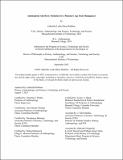Antimalarial Afterlives: Medicine for a Planetary Age from Madagascar
Author(s)
Robbins, Gabrielle Lydia Marie
DownloadThesis PDF (10.33Mb)
Advisor
Walley, Christine J.
Terms of use
Metadata
Show full item recordAbstract
This historical ethnographic dissertation investigates the politics of health and medicine in central Madagascar. Focusing on the island’s Covid-19 response, which revolved around the commercialization of “homegrown” pandemic therapeutics, I examine what made rapid development of “Made in Madagascar” medicines possible over the long durée as well as the social, political, religious, and ecological effects of this pivot to medical self-sufficiency. The island’s Covid drugs used medicinal plants, Artemisia annua, long cultivated as cash crops for exported antimalarial drug ingredients. But as artemisia was “repositioned” from a global antimalarial drug to a domestic Covid-19 treatment, I argue that social sciences of medicine must expand a “biographical approach” to pharmaceuticals with attention to drugs’ “afterlives” as therapeutic entities for novel diseases. I further suggest the frame of drugs’ afterlives can make clear how drug-making is also place-making, as artemisia stems become village building materials and important substances like firewood for daily life in cultivation hubs.
In order to fully understand Madagascar’s pandemic response, I also trace the arc of self-sufficiency politics on the island from the late 1800s to the present. I argue that the meaning of “self-sufficiency” is not stable but rather, multiple ideas about acceptable dependence overlap through time: colonial-era demands for fiscal self-sufficiency; socialist-era politics of isolationist centralized industry; and pandemic-era demands for resource sovereignty amid unstable global supply chains, a multiplicity that yields significant social complexity in the present.
I then draw on ethnographic data to analyze domestic medical industries’ sensory, religious, ecological, and political dimensions during overlapping Covid-19 and climate crises on the island. I argue that in contemporary Madagascar, drug-making offers therapy just as much as drug-taking, which forces expanded understandings of how medicines work and upon whom. This case study of medicine-making in Madagascar then concludes with a call for social studies of medicine to more fully integrate attention to religion and ecology in analyses of pharmaceuticals and medical politics.
Date issued
2023-09Department
Massachusetts Institute of Technology. Program in Science, Technology and SocietyPublisher
Massachusetts Institute of Technology